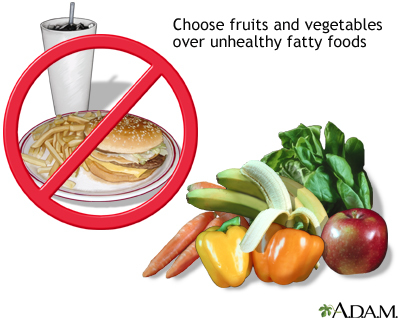Familial hypertriglyceridemia
Definition
Familial hypertriglyceridemia is a common disorder passed down through families. It causes a higher-than-normal level of triglycerides (a type of fat) in a person's blood.
Alternative Names
Type IV hyperlipoproteinemia
Causes
Familial hypertriglyceridemia is most likely caused by genetic defects combined with environmental factors. As a result, the condition clusters in families. How severe the disorder is can vary based on sex, age, hormone use, and dietary factors.
People with this condition also have high levels of very low density lipoprotein (VLDL). LDL cholesterol and HDL cholesterol are often low.
In most cases, familial hypertriglyceridemia is not noticeable until puberty or early adulthood. Obesity, hyperglycemia (high blood glucose levels), and high levels of insulin are often present as well. These factors may cause even higher triglyceride levels. Alcohol, a diet high in carbohydrates, and estrogen use can make the condition worse.
You are more likely to have this condition if you have a family history of hypertriglyceridemia or heart disease before age 50.
Symptoms
You may not notice any symptoms. Some people with the condition may have coronary artery disease at an early age.
Exams and Tests
The health care provider will perform a physical exam and ask about your family history and symptoms.
If you have a family history of this condition, you should have blood tests to check very low density lipoprotein (VLDL) and triglyceride levels. Blood tests most often show a mild to moderate increase in triglycerides (about 200 to 500 mg/dL).
A coronary risk profile may also be done.
Treatment
The goal of treatment is to control conditions that can raise triglyceride levels. These include obesity, hypothyroidism, and diabetes.
Your provider may tell you not to drink alcohol. Certain birth control pills can raise triglyceride levels. Talk to your provider about your risk when deciding whether to take these medicines.
Treatment also involves avoiding excess calories and foods high in saturated fats and carbohydrates.

You may need to take medicine if your triglyceride levels stay high even after making diet changes. Nicotinic acid, gemfibrozil, and fenofibrate have been shown to lower triglyceride levels in people with this condition.
Outlook (Prognosis)
Losing weight and keeping diabetes under control helps improve the outcome.
Possible Complications
Complications may include:
- Pancreatitis
- Coronary artery disease
Prevention
Screening family members for high triglycerides may detect the disease early.
Gallery

References
Genest J, Mora S, Libby P. Lipoprotein disorders and cardiovascular disease. In: Libby P, Bonow RO, Mann DL, Tomaselli GF, Bhatt DL, Solomon SD, eds. Braunwald's Heart Disease: A Textbook of Cardiovascular Medicine. 12th ed. Philadelphia, PA: Elsevier; 2022:chap 27.
Robinson JG. Disorders of lipid metabolism. In: Goldman L, Schafer AI, eds. Goldman-Cecil Medicine. 26th ed. Philadelphia, PA: Elsevier; 2020:chap 195.